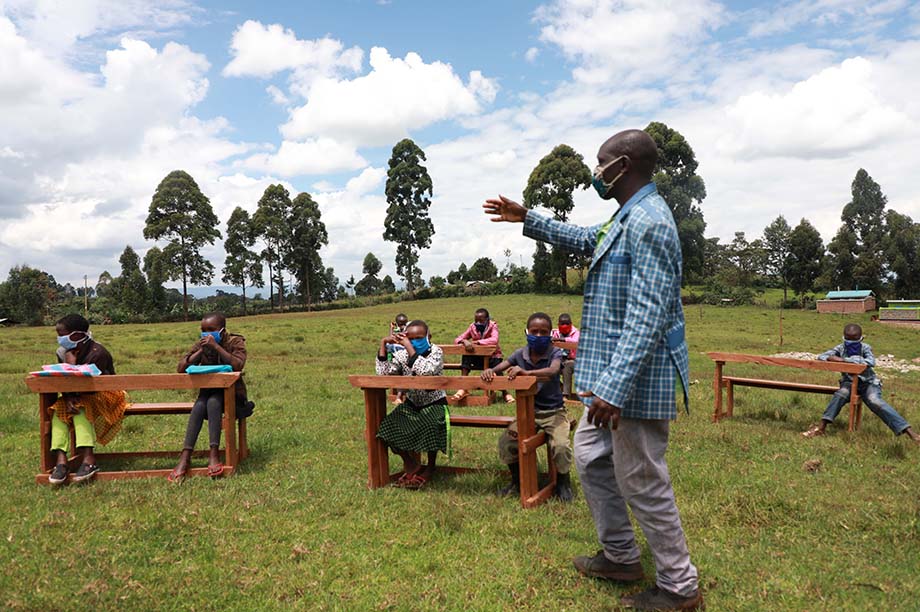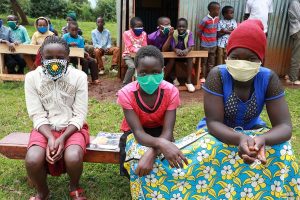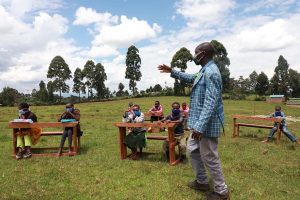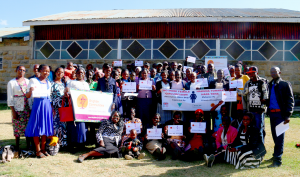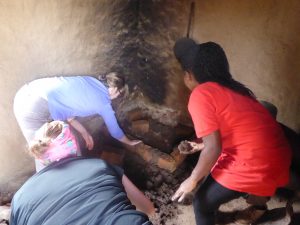When COVID-19 stop schools re-opening – what happens to the children?
COVID-19 has brought about many challenges not least to the lives of the children across Kericho County. As we launch a fundraising campaign to support community based learning groups for the children, we asked Maria Kidney – (co-founder and director) who has remained in Kenya with Martin Ballantyne (CEO), to share with us her thoughts and observations about the current situation for children in the area.
“As I walk through the villages here in Kenya on a daily basis, I can clearly see the situation worsening. The increased poverty, the fear, the concern, the growing number of young girls who are expecting, the sad faces of children out of school and working tirelessly in the fields etc. You can feel the uncertainty… it’s everywhere.”
Families, especially children, are really suffering. I went to visit one of our “learning groups” in Ndubusat village last Thursday. Children of all ages are part of our “book clubs” where a volunteer teacher helps them to read and they meet once a week to discuss what they have read. They are divided into classes and when I was there, about 15 children were gathered – spread out, socially distant and all wearing masks, even the smallest who was no more than 3 years old. I asked them to describe for me their typical day now that they have no school. They all replied with similar things. For the girls, they get up around 6am and make breakfast for the family. Then they help with household chores – cleaning, minding smaller children etc. and most days they then go to the forest to collect wood. They must also draw water for their families. Once these chores have been done, they look after the chickens and cow or go to the fields (the shamba) where they weed and plant seeds. It is often as late as 7pm when they return home before they get time to study and read. The same is true for the boys. They go to the fields with the animals early in the morning for grazing and don’t come back until late in the evening. A few things struck me as I listened to them; they were all tired and generally looked sad – like the life was gone from their eyes – and they barely smiled due to exhaustion. Many were hungry too, with limited food at home these days. I asked them what they missed most about school and they said their friends, their teachers and the “food scramble”. I didn’t know what this was so asked one of our team and she told me that it’s what all school kids call feeding time at school.
In the mornings they would have porridge, which they sit in groups to eat, and then the same at lunchtime when they are fed. Now they miss this – and they actually have less food which is shocking. Many parents are struggling, so in January many of them would use food to pay their school fees. They would give bags of maize or beans which would be valued and offset against their fees. They would calculate what food was needed at home based on the children getting fed in school. Now they are not in school but at home there is not enough food to go around, and so the hunger escalates. It is a huge, huge challenge.
With schools not opening until January at the earliest, the situation for most children is pretty shocking; they are so vulnerable. There is widespread abuse throughout the area and rising teenage pregnancies as girls use transactional sex to get money to be able to feed themselves and their families.
And so the hardship continues.
The children asked for a few things – some wanted exams as they want to know if they have learnt from their books. I found this incredible but on discussing it afterwards with the team I realised this is the education system here too – it is very much rote learning with tests to prove you have read etc. They also wanted some games they could play with maybe 3 or 4 –so things like skipping ropes, small balls etc. The small children who would normally be in pre-school equivalent are completely lost and end up being carried to the fields with the girls during the day. Small little activities for them as well were requested… All very simple but could do a lot to brighten their days, and bring smiles to their faces again…
The whole situation with children out of school is so sad – they truly could become the “lost generation” if things don’t change soon…

